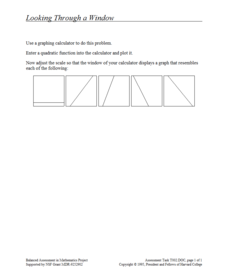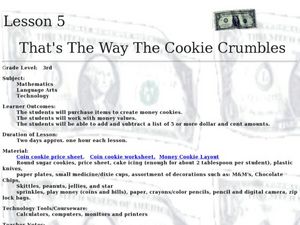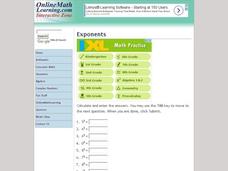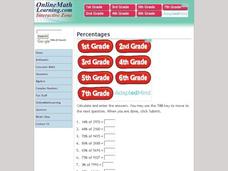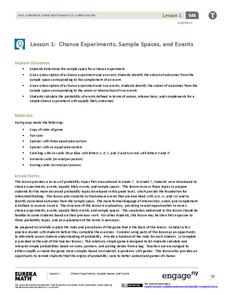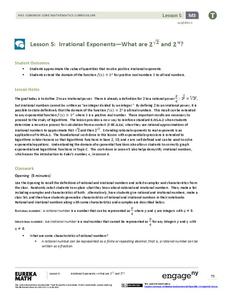EngageNY
Using Expected Values to Compare Strategies
Discover how mathematics can be useful in comparing strategies. Scholars develop probability distributions for situations and calculate expected value. They use their results to identify the best strategy for the situation.
Curated OER
Investigation Designing a Patchwork Quilt
Fourth graders practice calculating area by creating a classroom quilt. Students are given a 6x6 inch square material they design based on a classroom theme. A sample of the class quilt is created using graph paper so students may...
Curated OER
How Long Can You Go?
Eighth graders examine the usefulness of a line of best fit by collecting and graphing data, using a graphing calculator to determine the line of best fit, and making a variety of predictions. They watch a video, then design a...
Curated OER
Scale Model of the Solar System
Young scientists gain a better understanding of space, the solar system and its vastness by creating a scale model. Students first need to calculate the distance between each of the nine planets according to the size of their scale. This...
Curated OER
Scale Drawing: Insulating Another Attic
Give your future household repair specialists a real-life chance to apply the concepts of ratio and proportion. Using a scale drawing, they calculate the missing dimensions of two walls of a compound-shaped attic. They then figure how...
Curated OER
Volume
In this volume worksheet, learners solve and complete 10 different problems that include determining the volume of books in a library and their weight. First, they complete the table with the weight, number of days and number of boxes...
Curated OER
Super Size It, Please!
Pupils take photos from a given distance and determine the height of the person using a scale factor. Pupils calculate the ratio of student actual height to student photo height. They take pictures from 3 different distances to see if...
Curated OER
Residential Power System
Perform data analysis on energy consumption to apply algebraic expressions to the real world. Learners will write and solve equations that answer various questions from residential power use. They will collect data at home and calculate...
Curated OER
Rolling Twice
Rolling dice is the best way to show your learners how probability comes in to play. Although this lesson does not specify an activity, your mathematicians can try this probability with real dice to calculate their experimental...
Federal Reserve Bank
Savvy Savers
What are the benefits and risks of saving in an interest-bearing account? Pupils explore concepts like risk-reward relationship and the rule of 72, as well as practice calculating compound interest, developing important personal finance...
Virginia Department of Education
Simplifying Square Roots of Whole Numbers
Simplify your life by using a resource on simplifying square roots. Pupils review square roots and calculate values of given radical expressions using a calculator. The lesson plan concludes by having them consider the results to develop...
Concord Consortium
Looking through a Window
Here's a window into graphing calculators. Scholars use a graphing calculator to plot a quadratic function. They then adjust the window to make the graph look like that of a linear function and must recreate given graphs.
Curated OER
Stadiums in America
Let's play ball! A great springtime activity to learn about ratios. This activity challenges learners to draw stadiums to scale on standard letter paper and also on construction paper. This three-day activity includes a pre-assessment...
Curated OER
Using a Calendar and Using a Time Line
In this math/social studies worksheet, students examine 2 calendar pages and answer 12 questions about them. Students then investigate a time line of important math inventions and discoveries and answer 8 questions.
Alabama Learning Exchange
Comparing Fuel Economy
Compute fuel economy and gas mileage. Why? So you can teach rates and ratios, of course! Middle schoolers calculate the rate of miles per gallon for various vehicles. They research each vehicle, its mileage per gallon, and cost per...
Curated OER
Area of Tangram Pieces
Mathematicians calculate the area of a tangram piece without using formulas. They use a geometry journal to record activities during this lesson. They make a set of tangrams and use them to compute area. They use what they discover to...
Curated OER
That's The Way the Cookie Crumbles
Third graders work with money values and making purchases. In this money instructional activity, 3rd graders listen to Donna Guthrie's book, Real World Math: Money and Other Numbers In Your Life. They make money cookies either with a...
Curated OER
Exponents Online
A new worksheet every time! In this exponents worksheet, students calculate numbers up to 10 with the exponent of 3. Students complete 10 problems total on this worksheet.
Curated OER
Interactive Zone: Percentages
Learners calculate the percent of a number. This one-page instructional activity contains 10 problems. Answers are provided.
Curated OER
Finding Percentages
Here is an approach to calculating percent with 16 practice problems to solidify the skill. Two examples demonstrate dividing by 100 to get one percent and then multiplying by the percentage in question to get the solution. Learners find...
Curated OER
Problems Using Time
What time was it 20 minutes ago? Once your time-tellers have the basic skill down, take it up a notch with these word problems. Each one references a clock face, and scholars answer four questions for each of the three clocks (two analog...
EngageNY
Chance Experiments, Sample Spaces, and Events
Want a leg up on the competition? Show classes how to use mathematics to their advantage when playing games. Learners calculate probabilities to determine a reasonable scoring strategy for a game.
EngageNY
Irrational Exponents—What are 2^√2 and 2^π?
Extend the concept of exponents to irrational numbers. In the fifth installment of a 35-part module, individuals use calculators and rational exponents to estimate the values of 2^(sqrt(2)) and 2^(pi). The final goal is to show that the...
EngageNY
Expected Value of a Discrete Random Variable
Discover how to calculate the expected value of a random variable. In the seventh installment of a 21-part module, young mathematicians develop the formula for expected value. They connect this concept the dot product of vectors.
Other popular searches
- Calculator Math Games
- Graphing Calculator and Math
- Non Calculator Math
- Graphing Calculator Math
- Calculator Math Free
- Math Using a Calculator
- Activity Calculator Math
- Calculator Math Percentages
- Calculator Math Fractions
- Calculator Math Lessons
- Calculator Math Word Games
- Math Calculator Activities













